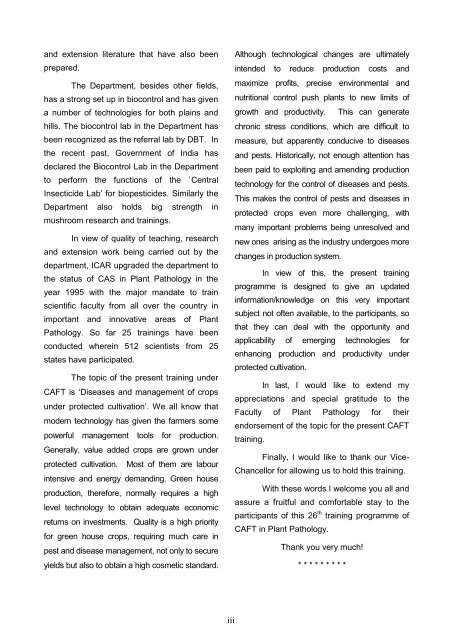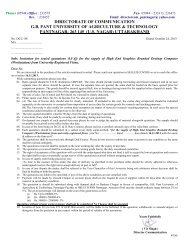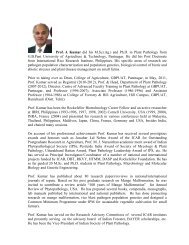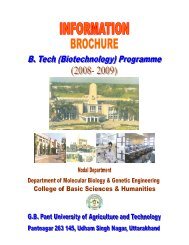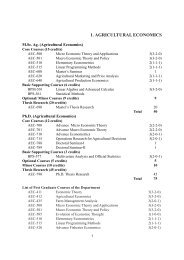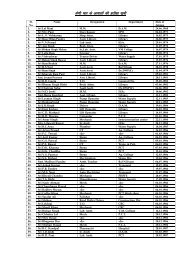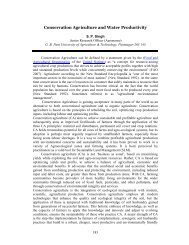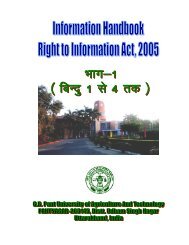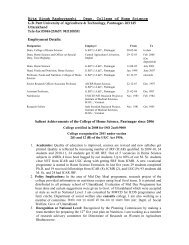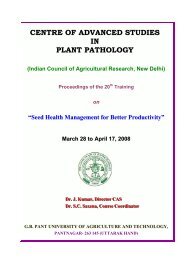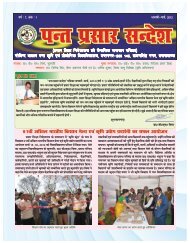Diseases and Management of Crops under Protected Cultivation
Diseases and Management of Crops under Protected Cultivation
Diseases and Management of Crops under Protected Cultivation
You also want an ePaper? Increase the reach of your titles
YUMPU automatically turns print PDFs into web optimized ePapers that Google loves.
<strong>and</strong> extension literature that have also been<br />
prepared.<br />
The Department, besides other fields,<br />
has a strong set up in biocontrol <strong>and</strong> has given<br />
a number <strong>of</strong> technologies for both plains <strong>and</strong><br />
hills. The biocontrol lab in the Department has<br />
been recognized as the referral lab by DBT. In<br />
the recent past, Government <strong>of</strong> India has<br />
declared the Biocontrol Lab in the Department<br />
to perform the functions <strong>of</strong> the `Central<br />
Insecticide Lab’ for biopesticides. Similarly the<br />
Department also holds big strength in<br />
mushroom research <strong>and</strong> trainings.<br />
In view <strong>of</strong> quality <strong>of</strong> teaching, research<br />
<strong>and</strong> extension work being carried out by the<br />
department, ICAR upgraded the department to<br />
the status <strong>of</strong> CAS in Plant Pathology in the<br />
year 1995 with the major m<strong>and</strong>ate to train<br />
scientific faculty from all over the country in<br />
important <strong>and</strong> innovative areas <strong>of</strong> Plant<br />
Pathology. So far 25 trainings have been<br />
conducted wherein 512 scientists from 25<br />
states have participated.<br />
The topic <strong>of</strong> the present training <strong>under</strong><br />
CAFT is ‘<strong>Diseases</strong> <strong>and</strong> management <strong>of</strong> crops<br />
<strong>under</strong> protected cultivation’. We all know that<br />
modern technology has given the farmers some<br />
powerful management tools for production.<br />
Generally, value added crops are grown <strong>under</strong><br />
protected cultivation. Most <strong>of</strong> them are labour<br />
intensive <strong>and</strong> energy dem<strong>and</strong>ing. Green house<br />
production, therefore, normally requires a high<br />
level technology to obtain adequate economic<br />
returns on investments. Quality is a high priority<br />
for green house crops, requiring much care in<br />
pest <strong>and</strong> disease management, not only to secure<br />
yields but also to obtain a high cosmetic st<strong>and</strong>ard.<br />
Although technological changes are ultimately<br />
intended to reduce production costs <strong>and</strong><br />
maximize pr<strong>of</strong>its, precise environmental <strong>and</strong><br />
nutritional control push plants to new limits <strong>of</strong><br />
growth <strong>and</strong> productivity. This can generate<br />
chronic stress conditions, which are difficult to<br />
measure, but apparently conducive to diseases<br />
<strong>and</strong> pests. Historically, not enough attention has<br />
been paid to exploiting <strong>and</strong> amending production<br />
technology for the control <strong>of</strong> diseases <strong>and</strong> pests.<br />
This makes the control <strong>of</strong> pests <strong>and</strong> diseases in<br />
protected crops even more challenging, with<br />
many important problems being unresolved <strong>and</strong><br />
new ones arising as the industry <strong>under</strong>goes more<br />
changes in production system.<br />
In view <strong>of</strong> this, the present training<br />
programme is designed to give an updated<br />
information/knowledge on this very important<br />
subject not <strong>of</strong>ten available, to the participants, so<br />
that they can deal with the opportunity <strong>and</strong><br />
applicability <strong>of</strong> emerging technologies for<br />
enhancing production <strong>and</strong> productivity <strong>under</strong><br />
protected cultivation.<br />
In last, I would like to extend my<br />
appreciations <strong>and</strong> special gratitude to the<br />
Faculty <strong>of</strong> Plant Pathology for their<br />
endorsement <strong>of</strong> the topic for the present CAFT<br />
training.<br />
Finally, I would like to thank our Vice-<br />
Chancellor for allowing us to hold this training.<br />
With these words I welcome you all <strong>and</strong><br />
assure a fruitful <strong>and</strong> comfortable stay to the<br />
participants <strong>of</strong> this 26 th training programme <strong>of</strong><br />
CAFT in Plant Pathology.<br />
Thank you very much!<br />
* * * * * * * * *<br />
iii


